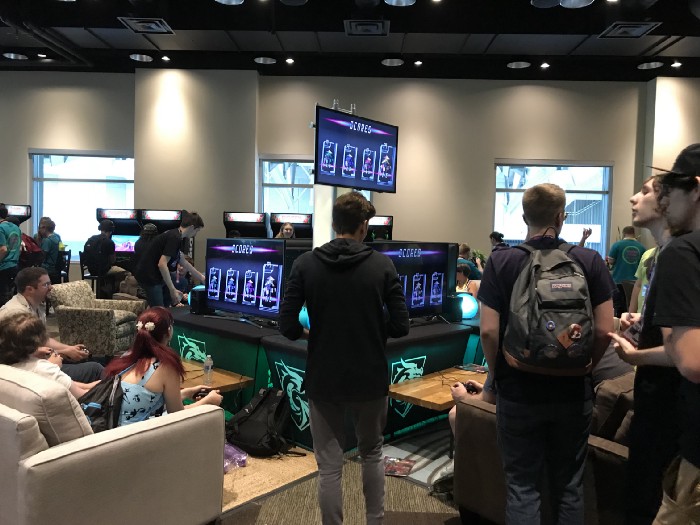A few years ago, Roland Munguia and his twin brother, Jesse, hopped in a cab in their Mexican rural hometown and took a five-hour trip to Guadalajara, just so they could meet with one of their video game heroes in a hotel lobby. What was supposed to be a short chat lasted almost four hours, when it was time for that hero, Antonio Uribe, co-founder and director of HyperBeard Games, to leave. So the twins jumped back in a cab and, still buzzing from what they had just experienced, headed home. “It was amazing,” Roland Munguia recalls.
Turns out there was a method to the brothers’ “madness.” For more than a decade, Roland and Jesse, now 19-year-old sophomores at DigiPen Institute of Technology in Redmond, Washington, have dreamed of making video games. Jessie is an artist, whereas Roland writes code. Recently, Roland also earned an ESA Foundation scholarship, which is awarded to women and minority college students with a passion for working in the video game industry. It’s his second in two years.
“Being awarded the ESA Foundation scholarship twice feels great, and it’s a reminder to keep pushing forward,” Roland says. “The scholarship helps me fund and continue my education at DigiPen, which has been incredible and really insightful.”
Studying at DigiPen is a big deal for the twins, whose dad is a Mexican-American carpenter and whose mom is a homemaker. They spent their first four years in the United States, then lived in Mexico through their junior year of high school, when they discovered the video game design program at DigiPen. After moving back to the US, they spent senior year focused on their studies and whatever else was necessary to enroll at DigiPen, where they also receive scholarships.
In Mexico, however, it’s far more difficult to get one’s foot in the video game industry’s door. “It’s just that the industry is scattered,” Roland explains. “There’s no hub where game developers work and live together. In my small hometown, the only other person into game development was Jesse. That’s why we reached out to other gamers on Twitter, to try and put together a community, to see what other people were doing and learn from them.”
Twitter was also what they used to contact Uribe and set up that initial get-together. Now based in the US, they followed it up with another face-to-face meeting with Uribe in San Francisco in March. It was there, as an ESA Foundation scholar, that Roland attended two big industry events: the ESA Foundation’s annual gala fundraiser, Nite to Unite, and the Game Developers Conference, whose organizers generously provided 10 scholars with access.
Nite to Unite (NTU), attended by more than 600 industry leaders, proved to be a great opportunity. “I talked with fellow scholars and businesspeople about video games, indie studios, entrepreneurship, and my journey as a game developer,” Roland recalls. “I met awesome copyright and law professionals, who shared a lot about the legal aspects. And I was inspired by the stories the NTU honorees told.”
Those stories resonated for good reason. As a result of the Munguia brothers being born prematurely, Jesse has a heart condition, Roland scoliosis, or curvature of the spine. “The angle of the curvature was growing as I grew,” he says. So at 16, he underwent surgery to correct it, then spent six months in a cast.
The Starlight Children’s Foundation, one of NTU’s honorees, provides health-care facilities with video game carts so that seriously ill children can play games to distract them from pain and anguish. The other honoree was the team behind the Xbox Adaptive Controller, a device tailored to the specific needs of players with limited mobility.
“So I see the potential in what Starlight and Xbox are doing, and I’m grateful they’re doing it,” says Roland.
Physical challenges aside, the Munguia brothers had a happy childhood, which included playing video games. “My dad bought me a Gameboy, a Sesame Street game,” Roland says. “I played that for a bit.” But when his uncle, 18 at the time, introduced the twins to Pokemon Red, “I remember wanting to play all night,” Roland recalls. “We’ve bonded over video games over the years. He has his own kids now, and we all play together.”
For computer programmers, freshman year at DigiPen is focused on the technical aspects of game design, with a team of programmers working on projects together. But as ambitious as the Munguias are, they bent the rules a bit last year. “We also had two artists — one was Jesse, the other a brother of another programmer — and a sound designer on our team,” Roland explains. “So we had more like a complete team.”
One of their games, “DeltaBlade 2700,” was shared in a DigiPen showcase. As it demonstrates, the Munguias lean toward making local multiplayer games. “That’s really easy to make friends with,” Roland explains. “We tend to like those games, because we used to play together a lot.”
Over the spring and summer, the Munguias’ team continued to develop DeltaBlade 2700, which they published on Steam, an online game platform, in August, just in time to present it at PAX West in Seattle.

Now back at DigiPen, they’re in the early stages of developing a new game while also planning for the future. “Our main goal,” Roland says, “is to have our own studio together one day.” In the meantime, they’re learning all they can about design and, in Roland’s case, taking advantage of what the ESA Foundation scholarship offers.
“I’m grateful for the scholarship, for everything the association has done,” he says. “And I’m looking forward to seeing what the other scholars do and what they’re going to develop.”
Rich Shea is a freelance writer living in Washington, D.C.